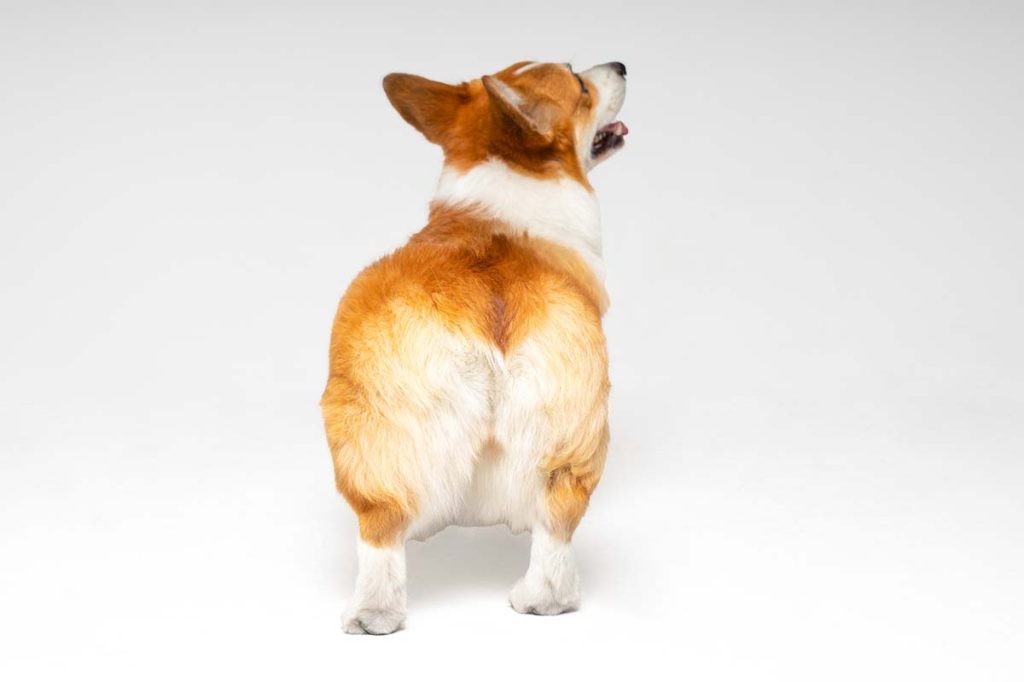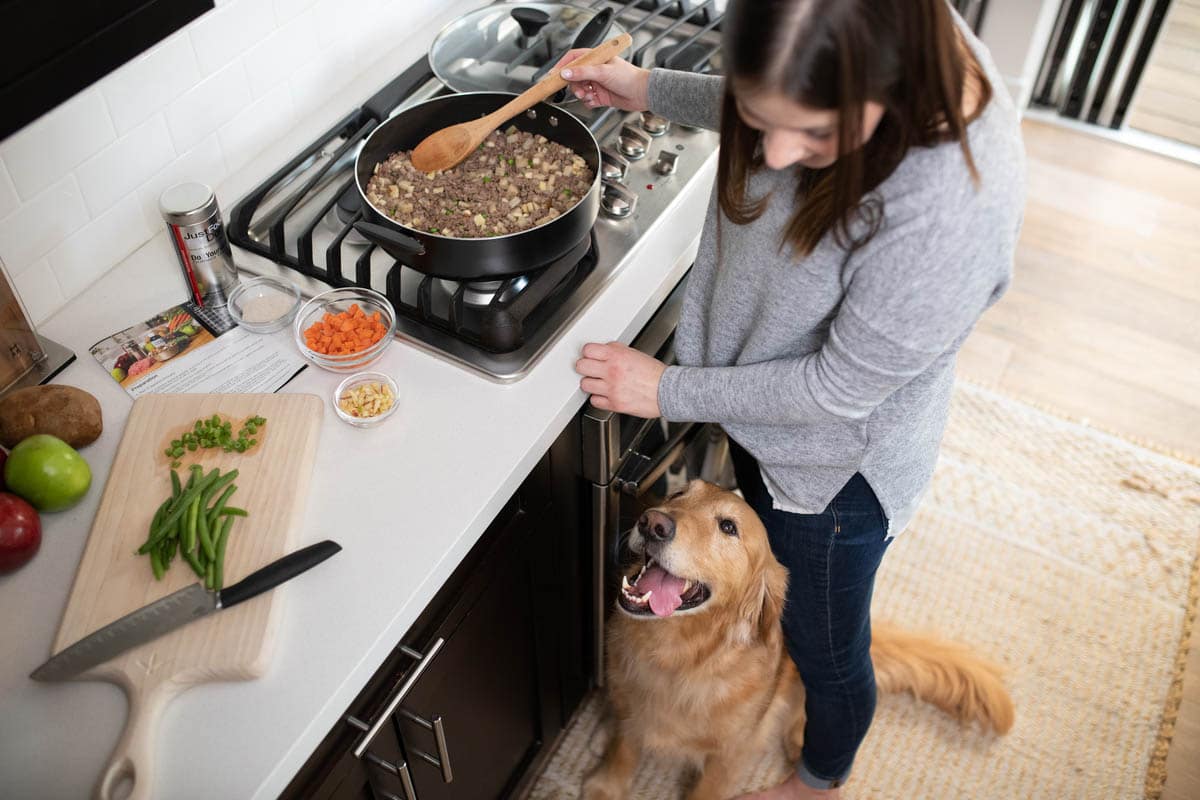Why Does My Dog Fart So Much?
Is your dog gassy? If your dog is farting a lot more than usual, it could be from one of three things.
If your dog is farting a lot more than usual, it could be from one of three things:
- Diet
- Underlying disease/illness
- Eating habits
Let’s dive into each for a comprehensive understanding of why your pup is farting so much.
1. Diet and Your Dog’s Gas

We once received a funny email from one of our customers, it was titled “by the way…..good intel for your farty dog clients…” and it said:
“I have 2 Frenchies. They used to be terrible farters, even on prescription, supposedly high-quality food. They’ve been on JFFD for about 2 months now and are FART FREE!! YAY! We can have company over again, LOL! Just thought that might help you if you get that question.”
We do get this question a lot – why does my dog fart so much? or, why does my dog poop so much? The answer is usually a similar one for both.
Excessive gas and increased fecal output is usually a sign of indigestion of some sort. Thus, flatulence and excessive pooping may be signs that your dog is having trouble digesting his/her dog food. Although there are also some diseases that could cause these signs, (and those must be considered), many times, simply upgrading the low-quality food to a more bioavailable, higher-quality diet will resolve the gas and fecal volume problem.
Conversely, some dog owners also become concerned about the reduced amount of feces produced after switching to our diets. People say, “My dog used to poop three times a day – a lot, and now he only poops a small amount, once – where is it all going?”
We have to remind clients that dog poo is essentially “waste”. It is the indigestible portion of the food. Thus many times: the least poop, the better nutrition (provided the dog isn’t losing weight).
Dr. Julie Stegemen, a board-certified veterinarian in internal medicine, explains this dog poo phenomenon for pet parents in the video below.
2. Disease or illness
According to Texas A&M University’s School of Veterinary Medicine & Biomedical Sciences, your dog’s excessive flatulence could be a sign of an underlying health problem.
Possible health issues that are common causes of dog gassiness include:
- Irritable bowel syndrome
- Intestinal parasites
- Exocrine pancreatic insufficiency
- Pancreatitis
- Inflammatory bowel disease (IBD)
- Bloat
If the chronic flatulence is not from your dog’s diet, make an appointment with your veterinarian to determine the underlying cause.
Digestive issues or infections are another common cause of gas production in dogs. IBD is a medical condition where your dog’s gastrointestinal tract becomes inflamed. This can come from a reaction to a parasite or bacteria, or a bad reaction to certain proteins in their diet. IBD can result in poor digestion which can lead to an increase in flatulence from Fido.
Irritable bowel syndrome (IBS) can be another culprit of excessive gas. This is where your dog’s intestinal muscles struggle to function normally, leading to issues like diarrhea or constipation and of course, flatulence. In dogs, IBS is often stress or anxiety related which can be caused by things like moving, separation anxiety, a new baby, or a new pet in the home.
Gastrointestinal upset
Research shows that when the dog’s digestive system is upset, it may benefit from probiotic supplements. “Probiotics normalize the conditions in the intestines by changing the local acidity of the digestive tract and releasing short-chain fatty acids,” reads an article in Cornell University College of Veterinary Medicine’s DogWatch newsletter. “This gives dogs a leg up if they end up ingesting harmful bacteria such as Salmonella.”
The “good bacteria” provided by probiotics can improve and maintain a dog’s digestive health, and in turn, reduce large amounts of farting.
Food intolerance or allergies
Your dog’s flatulence could be from food sensitivity. If your dog’s gas is accompanied by diarrhea, inflamed skin, itchiness, or an ear infection, food allergies could be the culprit.
Take your pet to the DVM to determine the exact cause. It could be anything from dairy products/lactose or Brussels sprouts to poultry or soybeans, so they will likely tell you to do an elimination diet. Then you can figure out how to alter their dog food to a new food that is more tummy-friendly.
Avoid giving table scraps of human food that they may have an intolerance to. Introduce new foods slowly and make sure the human food you do share is safe for dogs are two ways to prevent food allergies from affecting your dog too seriously.
3. Eating habits/swallowed air
When your dog eats or drinks water, they also ingest small amounts of air. When dogs swallow air in high enough amounts this leads to gas. So does feeding your dog too soon after exercising if they haven’t had a chance to catch their breath.
Certain types of dogs known as brachycephalic breeds have shorter heads and tend to swallow more air while they’re eating or drinking because of the way their noses are positioned on their face. Examples of these types of dogs include bulldogs, pugs, and Boston terriers.
If you can rule out disease and diet as the causes of your dog’s toots, their eating habits could be the culprit of their bad gas.
Does your dog eat kibble so fast that mealtimes last only a few seconds? Speedy eaters aren’t just inhaling their pet food, but wolfing down lots of buildup swallowed air. A lot of air in your dog’s body causes severe digestive issues that can lead to bloat (where the stomach twists), which is deadly if not treated quickly.
If your furry friend eats with the speed of Usain Bolt, it’s time to look into getting a slow feeder to prevent serious consequences.
Helping Your Gassy Dog
Don’t share table scraps. There are plenty of human foods that are safe to share with your dog, though some of them (like Brussels sprouts) may contribute to your dog passing gas. It’s often not the foods themselves but the oils, seasonings, and other flavors in human foods that can be irritating to your dog’s digestive system.
Some dog breeds, specifically brachycephalic breeds like pugs and French bulldogs, seem more prone to smelly gas than others. When excessive farting isn’t a result of an underlying illness, however, it usually ultimately boils down to diet.
Take things slow when transitioning your dog to a new food. They could get an upset stomach due to such a sudden change.
To make the transition, mix your dog’s current food with their new food, gradually decreasing the amount of old food and increasing the amount of new food over a period of 7 days.

Evaluate their diet as well. Your dog’s diet should include varied sources of nutrition including proteins, carbohydrates, vitamins, and minerals.
Again, talk to your veterinarian to narrow down the exact cause of your dog’s excessive flatulence.
This content is for informational use only and does not replace professional nutrition and/or medical advice, diagnosis, or treatment. It is not a substitute for and should not be relied upon for specific nutrition and/or medical recommendations. Please talk with your veterinarian about any questions or concerns.
“The Power of Probiotics.” 2022. Cornell University College of Veterinary Medicine. 2022. https://www.vet.cornell.edu/departments-centers-and-institutes/riney-canine-health-center/canine-health-information/power-probiotics.
tamuvetmed. 2017. “Gassy Pets.” VMBS News. May 26, 2017. https://vetmed.tamu.edu/news/pet-talk/gassy-pets/.









